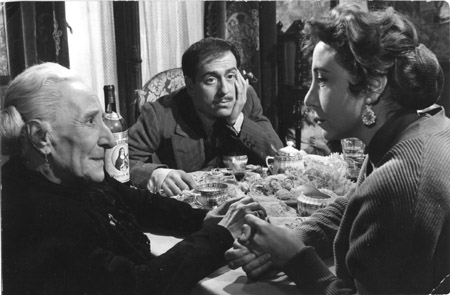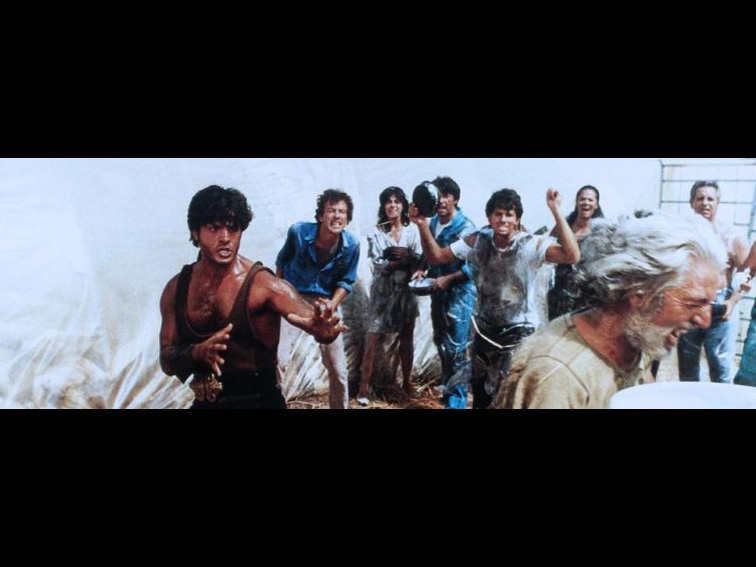
Just heard that the great Spanish comedy actor Jose Lui Lopez Vazquez died on November 2nd. Here’s an obituary from EInsiders.com:
José Luis López Vázquez de la Torre, March 11, 1922 – Nov. 2, 2009, popular Spanish actor who often worked with director Antonio Mercero, has died. He was 87.
Vázquez and Mercero , together gained considerable fame with the 1972 Emmy award winning short horror “La Cabina” or, in English, “The Telephone Box.” The 35-minute film was co-written by Mercerno and Jose Luis Garci and Vazquez played the leading role as a man that becomes trapped in a telephone booth. Onlookers seem unable to help him. A truck from the telephone company arrives, loads the booth with its trapped occupant onto a truck, and takes it away. When the truck arrives at its destination, the horrified man finds that he has been taken into a large room filled with phone booths, all containing a dead person. The final scenes show the phone company delivering a freshly cleaned and empty phone booth back to the street to await another victim.
“La Cabina” earned Vázquez a Fotogramas de Plata Award for Best TV Performer, and a Premio ACE Award for Best TV Actor. The short also won an International Emmy for Fiction and a Premio ACE for Best TV Scenic Program.
José Luis López Vázquez had a prolific film career starring in more than 200 movies and earning a total of twenty separate awards. His body of work began at the age of 17 and lasted through 2006 in his last production with director Mercero, the movie called “¿Y tú quién eres?”
Alex de la Iglesia, the President de la Academia de Cine stated, “Se va uno de los actores más grandes, una de las patas de la mesa del gran cine español junto con Fernando Fernán Gómez y Pepe Isbert.” The quote meaning Vázquez was one the biggest actors and considered a foundation of Spanish film right along with greats such as Fernando Fernán Gómez and Pepe Isbert.
As well as being a comedian, Vasquez also appeared in anumber of peculiar films int he late 60s and 70s which are of interest to fans of Eurobis cinema. Some personal favourites include: Zarabanda Bing Bing, a 1966 spy comedy directed by Jose Maria Forque, Eugenio Martin’s giallo The Fourth Victim (71) and Pedro Olea’s No es bueno que el hombre esté solo (73), a thriller in which he plays a man who is in a relationship with a mannequin! In fact, it seems like The Telephone Box, which is mentioned in the obit, was so succesful that it projected him into a second career as a star of dark dramas.
[update]
There’s a nice obituary in today’s Guardian:
The Spanish actor José Luis López Vázquez, who has died aged 87, was so much a part of Spanish cinema for six decades, appearing in almost 250 films between 1948 and 2007, that it seems inconceivable without him. Short and bald, with a little moustache, bearing a certain resemblance to Groucho Marx, he often embodied the average Spaniard. “I was an insignificant person, and I stayed that way,” López explained.
As most of López’s career was synchronous with Francisco Franco’s 36-year repressive regime, when it was almost impossible for Spain to create a vibrant film industry and for talented film-makers to express themselves freely, the majority of his films were conveyor-belt comedies and melodramas, strictly for home consumption. Nevertheless, in the 1950s and 60s, despite restrictions, a distinctive Spanish art cinema managed to emerge, led primarily by the directors Juan Antonio Bardem, Luis García Berlanga and Carlos Saura, and the screenwriter Rafael Azcona. López played important roles in a dozen films by Berlanga and four by Saura – many of them written by Azcona – which gained international attention.
Born in Madrid of working-class parents, he was brought up by his mother after his father abandoned the family. “We were very poor – my mother earned three pesetas a day – but I never felt any resentment. I was a very independent child,” López recalled. A gifted painter, he was forced to give up his studies to earn a living and joined a Falangist youth theatre as a set decorator and costume designer, though he was not political. Called upon to replace an actor one evening, he was so impressive that he was asked to continue acting and, at 17, joined a theatre troupe led by the actor Conchita Montes.
In film he began as a costume designer and assistant director, while playing bit parts. However, his comic talent soon became apparent and he began to get bigger roles. After more than 20 films in eight years, López was given the chance to be appreciated abroad for the first time, thanks to the Italian director Marco Ferreri during Ferreri’s two-year sojourn in Spain.
El Pisito (The Little Flat, 1958) was an anti-bourgeois black comedy centred on a timid, middle-class man – López, perfecting his dazed and lost look – who marries a crotchety, dying octogenarian in order to inherit her apartment and eventually marry his fiancee of 12 years.
Ferreri’s El Cochecito (The Wheel-chair, 1959), was a sardonic study of geriatric revolt in which an elderly but fit man becomes obsessed by the desire to own a motorised wheelchair like those of his disabled friends, one of whom is drolly played by López. Both films, adapted by Azcona from his novels, were oblique critiques of Franco’s totalitarian regime. So too were Berlanga’s savage satires, Plácido (1961) and El Verdugo (The Executioner, 1962). López played a photographer in the former, a mocking portrait of officialdom and Christian charity, and a tailor in the latter. Plácido won him one of 15 best actor awards during his long career.
López revealed his ability to play drama in the films of Saura, beginning with Peppermint Frappé (1968), in which he portrayed a doctor becoming obsessively infatuated with his brother’s attractive wife, with tragic consequences. He is superb as a man whose disturbed mind falls prey to illusions as a result of his repressed religious upbringing.
In Saura’s The Garden of Delights (1970), López is compelling as a ruthless tycoon, catatonic and paralysed in a wheelchair after a car accident, who holds the key to his family’s fortune. Even better was his sensitive performance in Saura’s Cousin Angelica (1973), in which he is a middle-aged bachelor who finds, on his return to Barcelona after many years away, that the cousin he loved as a child is now married to a fascist. Also in 1973, he made the notable thriller No Es Bueno Que el Hombre Esté Solo (It Is Not Good for Man to Be Alone), as a widowed man living with a life-size doll whose secret is discovered by a new neighbour.
In 1972 López made 11 films, including tour-de-force performances in Mi Querida Señorita (My Dearest Senorita), in which he plays a woman who discovers that “she” is a man; and in La Cabina, a 35-minute film made for television, as a man trapped in a telephone box. In the same year, he was seen in George Cukor’s Travels With My Aunt, as Maggie Smith’s wealthy former French lover. He continued to appear with great regularity in films and TV, notably in La Escopeta Nacional (1978), La Patrimonio Nacional (1981) and Nacional III (1982), Berlanga’s wry trilogy about the Leguineches, an impoverished aristocratic family.
López, who is survived by his fourth wife and four children (two each from his second and third marriages), was awarded the gold medal for fine arts by the Spanish government in 1985.
• José Luis López Vázquez de la Torre, actor; born 11 March 1922; died 2 November 2009

Comments